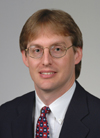Program director finds opportunity at MUSC
by Heather WoolwinePublic Relations
The future of health care rests with research, and the ability of those in charge of departments and medical centers across the nation to recognize that destiny.
It is this type of forward thinking that linked the research and patient goals of MUSC and the career path of Ted Meyer, M.D., Ph.D., new director of the Cochlear Implant Program in the Department of Otolaryngology.
 Dr.
Ted Meyer
Dr.
Ted Meyer
“MUSC was a great opportunity for me not only because of the academic and research vision for the university as a whole, but because it was important for me to work with a department chair who promotes all aspects of otolaryngology,” Meyer said. “Dr. Lambert is not only a well-respected academic surgeon, he's a really nice guy. He and I share common clinical and research interests and a similar vision for the department. If you asked us before I was hired how we envision the growth and development within otolaryngology and skull-base surgery, you would have heard virtually the same answer from both of us.”
This eye-to-eye level prompted Meyer and his fiancée, Allison Hardwick, to leave for Charleston in late June, after Meyer completed a fellowship in otology-neurotology at the University of Iowa.
“The humidity down here is pretty impressive,” Meyer joked.
Meyer received his undergraduate degree in mathematics from Washington University in St. Louis, Mo., and his medical degree and graduate degrees in 1995 from the University of Illinois at Urbana-Champaign.
“While in medical school, I knew that I also wanted a Ph.D.,” he said, “and I trained with a well-known hearing scientist. As a physician, the most basic question you have to ask yourself is whether or not you want to operate. Once I chose to become a surgeon, I finished my Ph.D. in speech and hearing science and began my internship in general surgery.”
By 2002, Meyer completed a NIH postdoctoral research fellowship and residency in otolaryngology at Indiana University in Indianapolis, and moved on to a fellowship in otology-neurotology at the University of Iowa.
“Despite all of the training, you just can’t say, ‘Well, here I am, hire me,’” Meyer said. “Many physician-scientists remain at the institution where they trained, but Allison and I didn’t want to stay in the Midwest. MUSC presented the ideal situation on all fronts.”
Upon his arrival in early July, Meyer hit the ground running, immediately hiring a seasoned researcher, John King, Ph.D., and applying for several research grants.
Brought in to develop a cochlear implant research program, Meyer will focus on speech perception and developing models of spoken-word recognition to improve the knowledge about how implants affect communication and hearing. Meyer and King are also interested in improving the ability to evaluate the vestibular system for patients with hearing loss.
“Dr. Lambert and I agreed that hiring John as a part of the program would be the wisest move,” he said. “Not only has he participated in numerous cochlear implant research projects, but he also adds the perspective as an implant recipient himself.”
The first cochlear implant was placed in the 1950s, and after an increase in their popularity among surgeons in the 1980s, about 70,000 implants are currently in use worldwide. Patients eligible for the implants have profound sensorineural hearing loss. Rapidly changing since inception, the implants have tremendous research potential to better the lives of the patients they were created for, from areas related to packaging and engineering to understanding speech patterns with the help of an implant.
Currently a member of six professional organizations, Meyer was enthusiastic about his new position, despite the challenges associated with beginning a research program and building it from the bottom up.
“I look forward to working with other departments and fostering new and improved relationships with them,” he said. “It is not out of our reach to turn this program into one of the major cochlear implant research programs in the country, and I’d also like to see MUSC become a major skull-base surgery center as well.”
Friday, Aug. 6, 2004
Catalyst Online is published weekly, updated
as needed and improved from time to time by the MUSC Office of Public Relations
for the faculty, employees and students of the Medical University of South
Carolina. Catalyst Online editor, Kim Draughn, can be reached at 792-4107
or by email, catalyst@musc.edu. Editorial copy can be submitted to Catalyst
Online and to The Catalyst in print by fax, 792-6723, or by email to petersnd@musc.edu
or catalyst@musc.edu. To place an ad in The Catalyst hardcopy, call Community
Press at 849-1778.